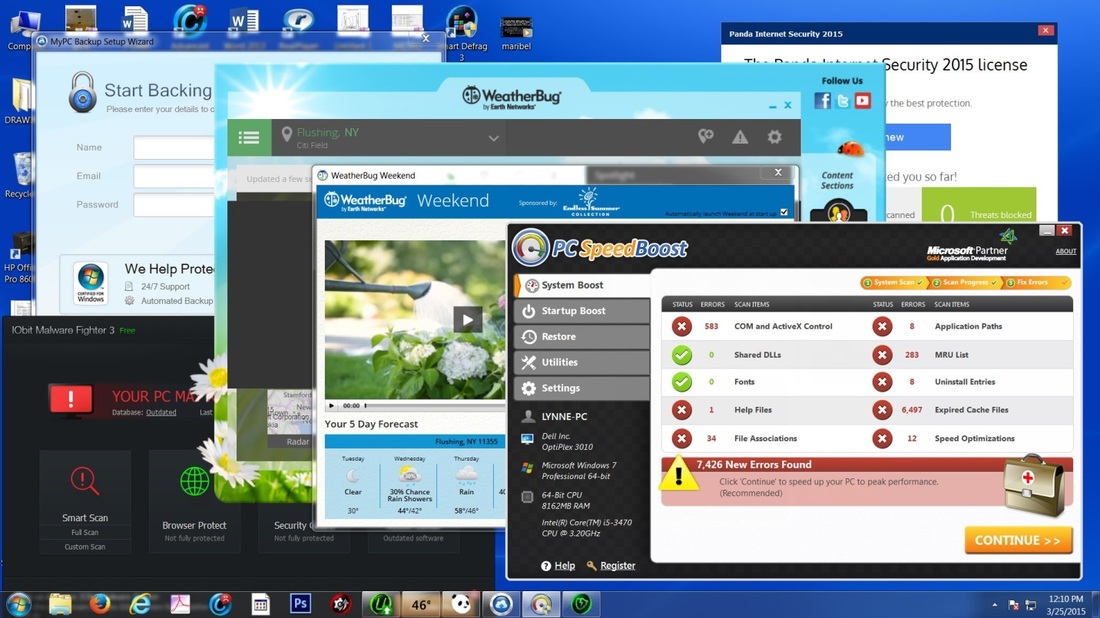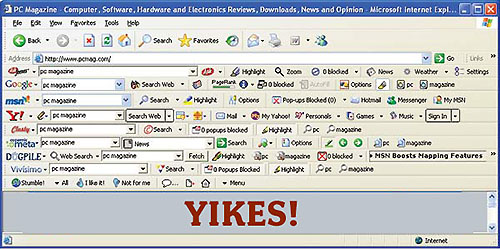 “Fool me once, shame on you. Fool me twice, shame on me,” as the saying goes. Unfortunately, Google has now been fooled by the same trick twice. For the second time in recent years, Google has allowed a malicious variant of the popular extension “AdBlock Plus” onto its Chrome Web Store. It was noticed by a security researcher going by the alias “SwiftOnSecurity.” Before Google removed it, it had been installed more than 37,000 times by unsuspecting users. This incident underscores a serious flaw in the way that Chrome extensions are uploaded to the Web Store. The entire process is automated, and Google only intervenes if an extension is reported as being problematic. Unfortunately, given the automated nature of the process, it’s almost frighteningly easy to abuse, and since there are no significant checks on the front end, hackers can upload extensions bearing the same or highly similar names as extensions from legitimate developers. Unless a user clicks on the “reviews” tab to read what other users are saying about the extension, at first glance, they’d have no real way of knowing that there was a problem until they started experiencing it for themselves. As mentioned, this is actually the second time this very extension was abused, the first being back in 2015. As malware goes, this one is annoying, but not awful. Instead of blocking ads, it has a tendency to open multiple new windows, displaying a torrent of unwanted advertising. Fortunately, there don’t seem to be any other “hooks” built into the code, so it doesn’t install more destructive malware, but it’s still annoying. All that to say, if you’ve been experiencing a sudden flurry of advertising popups, you may have been one of the unlucky few to have grabbed a malicious variant of an otherwise excellent web extension. If you have, just uninstall it and go grab a new copy, and you should be all set. Be sure to contact me if you have any questions.
0 Comments
 For a time, it seemed we had reached the high-water mark where Locky Ransomware was concerned. After the big, global attack earlier this year, interest in that particular strain of ransomware seemed to wane as hackers went off in search of the “next new thing” to deploy against the unwitting public. Unfortunately, rumors of Locky’s death may have been highly exaggerated. A massive new email campaign is underway, using Amazon as a cover, and the infected emails come bearing Locky as a “gift” to anyone who opens them and downloads the attachment. While no one knows who is behind the Locky software itself, this new email campaign is being run through a large botnet-for-hire called Necurs, which is currently made up of more than five million devices from all over the world. These devices have been sending out a million emails an hour that appear to come from Amazon and contain downloadable attachments with their malicious payload. The hackers are being quite savvy about the operation too, timing the sending of their emails so that they arrive during normal working hours, which makes them seem more legitimate. As ever, anyone unfortunate enough to download the attachment contained in one of these emails will soon find all the files on their system encrypted, and get a notification that they must pay a ransom in BitCoin if they want the unlock code to get their files back. It gets even worse, though. This latest attack does more than just install Locky. It also installs a program called “FakeGlobe,” which appears to be another variant of ransomware that’s designed to trigger after files are unlocked. So, even if you pay the ransom, you may find yourself immediately facing newly encrypted files and having to pay a second one. As ever, the keys to avoiding scams like these are vigilance, employee/family education and a robust backup and file recovery plan, in the event that someone in your organization or household does open one of these emails. And be sure to contact PC Tech for Hire for assistance in establishing your plan. You’re probably familiar with Equifax. As one of the three major US credit bureaus, the company exerts an outsized influence on millions of lives, because their record of your credit score plays a big role in determining if or whether you can get loans, and what your terms will be.
Unfortunately, Equifax was hacked, and the data breach is massive in scope and scale, impacting nearly 150 million people. In a company press release about the breach, Rick Smith, the Chairman and CEO of the company reported that they discovered an unauthorized access of their systems on July 29, and immediately contracted with a third-party forensics firm to lead the investigation. That investigation is ongoing, but thus far, the company can say with confidence that some 209,000 credit card numbers were exposed, along with personally identifiable information for approximately 182,000 US consumers. Mr. Smith also reported that limited information was exposed for British and Canadian residents, although exact numbers were not available for those countries. In a video message to the public, Mr. Smith had this to say: “This is clearly a disappointing event for our company, and one that strikes at the heart of who we are and what we do. I apologize to consumers and our business customers for the concern and frustration this causes. We pride ourselves on being a leader in managing and protecting data, and we are conducting a thorough review of our overall security operations.” As part of their overall response to the breach, the company has set up a website that consumers can visit to query whether they’ve been impacted. But unfortunately, the server is seeing such strong demand in the immediate wake of the breach that if you visit, you may simply get a “system unavailable” message until the surge of demand begins to die down. In any case, this latest breach serves as a stark reminder that no company is truly safe from the world’s increasingly sophisticated hackers. If you need any assistance with your computer or if you have become infected with a virus or have any computer question, don't hesitate to contact me. Welcome to PC Tech for Hire, Montgomery Alabama's affordable residential and small business computer repair and service provider.
I've talked about PUPs before, but if you missed the series of articles and have ever wondered what a PUP is, here it is: PUP stands for Potentially Unwanted Program, and is considered to be a form of malware. While they are not quite the same thing as standard viruses, they’re still not a good thing. PUPs are those programs that scoot in almost completely unannounced through downloads, usually as software bundles. Once installed, they will usually start harassing users pretty aggressively about one thing or another: your memory is low, you have outdated drivers that need to be fixed immediately, your system is insecure, etc. etc. (and as you might have guessed, these are all false and they want money to “fix” said problems). They may also start hijacking your browser to give you funny search engines, ads galore, and redirect you to websites you didn’t ask for. Sadly, even Macs are no longer immune from this problem. PUPs can be hard to catch before the fact, and even harder to remove after the fact, so I have a couple of recommendations to keep these things off your system. My number one recommendation is to use Chrome with Adblock exclusively. This particular combination will fend off a lot of unwanted drive-by installs. After that, I recommend fine-tuning your antivirus to actively look for PUPs in its sensitivity settings. Finally, I highly recommend installing a little program called Unchecky. This small program runs in the background, making sure that nothing tries to slip in when you’re installing something downloaded from the internet. It does a great job, and it’s free!
If you think you might have a few PUPs on your system, and aren't sure how to get rid of them, give me a call! My standard virus removal service will eradicate those pesky PUPs, and any other viruses or malware you may have. And if you contact me and mention this blog entry, I'll perform the virus removal service for FREE, with the purchase of a year of my ProActive Care - Antivirus service. The antivirus service I use includes PUP detection right out of the box. And, you'll have peace of mind knowing that your PC Tech is constantly monitoring the system and making sure it's eliminating threats to your computer. CLICK HERE to take advantage of this offer! I look forward to hearing from you! Welcome to PC Tech for Hire, Montgomery Alabama's premier residential and small business computer repair and service provider.
There is an increasing number of threats from infected web sites that show a pop up asking you to install a fake ‘Flash player’, ‘Video player’, or ‘Java update’ containing a Trojan downloader with actual malware viruses. My advice: “never click on a download offer, unless you went looking for it.” That includes sites that you may trust, like Facebook. If you get a pop up asking you to update, close the window and go to the actual website to download the (allegedly) out of date software.
I think my computer might be infected If your computer is infected, turn it off and seek professional service. Don’t try to fix it your self because many viruses try to hide and also multiply. Virus removal is not an easy task. Also don’t put it off and keep using it, a compromised computer puts you and others online at risk. My virus removal service is available, as well as my ProActive Care service that allows for ongoing monitoring and protection. February Special Starting today and lasting throughout February, sign up for ProActive Care - Antivirus service and get any viruses removed for free. Welcome to PC Tech for Hire, Montgomery Alabama's professional residential and small business computer repair and service provider.
When it comes to your browser, toolbars are almost always a bad idea. Sometimes you just open your web browser for the day and there they are--and no idea where they came from. They are often snuck in with other software installations, updates, or via a malware/spyware attack. Some toolbars are just annoying and take up room in your browser. Others do that AND facilitate browser hijacks that compromise your whole system’s security. How can you tell if a toolbar is bad? Well, I don’t think ANY toolbars are necessarily good (or even useful)--but if you’re seeing websites and search engines get redirected, that definitely needs to be fixed.
The reason it needs to be dealt with is that sometimes this is just the foot in the door to enable even worse malware to cause more problems in your computer later. Also, if it’s forcing you to use a search engine other than Google, you’re not going to get very good search results. In fact, a recent web report by Sophos revealed that Bing (Microsoft’s search engine) has twice as many “poisoned links” in their results as Google. ("Poisoned" links are links that will give your computer malware—i.e., search for one thing and get another!). This is another reason I recommend Google for search instead of Bing. Welcome to PC Tech for Hire, Montgomery Alabama's affordable residential and small business computer repair and service provider.
When it comes to anti virus & spyware programs, just how much difference is there between the paid for versions and the free ones?
In the “olden days” when computer viruses were just beginning to hit their heyday, you had to pay for all virus protection software. Nowadays, there are plenty of free virus protection programs available for users to download from the Internet. There are also many paid programs available, so you may be wondering whether you need to pay for virus protection software or if the free programs are adequate. To answer that question, you need to determine what your virus protection needs are and in what capacity you will be using your virus protection program. For example, the majority of free programs are designed for personal home use only, not for business use. So if you’re looking for virus software for your business, you’ll have to purchase a licensed version. There are several other differences between the paid and free versions as well. Performance The main reason you install virus protection software is to protect your computer against viruses, which can harm your computer. Tests have shown that both the free and the paid virus protection programs perform comparably in terms of detecting viruses on a computer. While this is incredibly important, there are other types of malicious programs and components that can infect your computer and cause irreparable damage or steal personal information. Detection and removal of spyware, malware and other nasty items is where the paid programs shine. Most of the free programs also detect malware, but the paid programs do a better job and detect more of the little nuisances, which means your computer is cleaner and your information is safer if you’re using a paid program. Additional Features Another way paid virus protection wins over users is by offering additional features. When comparing virus protection programs, you should take a look at these added features and see if any of them appeal to you. Examples of added features include parental controls, enhanced spam filters and identity theft protection. Avast’s paid program, Internet Security 6 Package, even opens up a new desktop for sensitive information, such as online banking, so other programs cannot steal account numbers or passwords. Support One of the major differences between free and paid virus programs is the customer support. Support is typically lacking or nonexistent with free programs because there is no money being exchanged. You may find a FAQ section on the company’s Web site or a limited help section built into the program, but the companies offering free software typically do not invest much money in support for these free programs. Paid programs, on the other hand, typically offer online and phone support for users. While you may not consider support to be a big deal, keep in mind that the free programs are often a bit more difficult to operate and navigate. If you decide on a free program, but are unable to set it up properly, it is useless. If you’re still unsure of whether to go with free or paid virus protection, think about how you use the Internet. For users who are frequently downloading files and surfing a wide range of sites, a higher level of protection is warranted. For people who do minimal surfing, do not download many files and do not use credit cards online or engage in online banking, a free version is most likely fine. You could always see if the paid program you like has a free trial and compare it to a free program for yourself. That way you’ll know if it’s worth spending the money each year for the paid version. With my antivirus protection service, ProActive Care - Antivirus, I also include the benefit of monitoring the system. This is something that medium to large businesses are able to do, but is rarely available for home users. On a daily basis, I personally check the antivirus system to make sure my clients are virus free. If I notice an issue, a quick call to my client will usually resolves the issue. My service also includes free virus removals, if something happens to get past the system. My service is business class protection at residential pricing. Contact me for a free trial of the service! Good luck, and stay clean from those malicious viruses! New services, now available from PC Tech for Hire! Welcome to PC Tech for Hire, Montgomery Alabama's affordable residential and small business computer repair and service provider. PC Tech for Hire is pleased to announce a new service called ProActive Care. Most of the services I provide are reactive. When something breaks, you call me. My new ProActive Care service is proactive at taking care of issues before it becomes problematic. Do you realize that you are about to run out of hard drive space? ProActive Care can monitor that. Do you know when your computer's CPU is being maxed out? Do you know why it is being maxed out? ProActive Care will monitor that, and in some cases, eliminate the issue. ProActive Care will also send alerts for serious issues. And, everything ProActive Care does is recorded and reported to you once a month. ProActive Care is being introduced at the low rate of $5.00 per month. Be sure to click here for more information, and to order when you're ready. Be sure to try it out with our exclusive 30 day free trial! PC Tech for Hire is also pleased to announce the addition of ProActive Care - Antivirus. Most of the free antivirus products available will protect you from viruses, malware and spyware fairly well. But they are not as good as or as feature rich as some of the paid versions. ProActive Care - Antivirus will give you business class protection at an affordable price, just $5.00 a month. Be sure to click here for more information. And yes, PC Tech for Hire also provides a 30 day free trial of ProActive Care - Antivirus! Do you have important data that you simply can not lose? PC Tech for Hire is also announcing the availability of ProActive Care - Backup! This service provides a secure and highly reliable backup. And it includes versioning control. Is the current version of a document wrong? Versioning control allows you to step back in time and retrieve a copy of that document before it became corrupted. Most other backup solutions will write over the good copy with the bad copy. ProActive Care - Backup only costs $9.00 a month for 10 GB file space. Click here for more information. A 30 day 1 GB free trial is available so that you can see for yourself how easy the service is. The most important advantage of all the ProActive Care services is that PC Tech for Hire is monitoring all aspects of the services. If you want a PC Tech watching over your computer, making sure everything is running well, then this service is for you. Contact PC Tech for Hire today for a custom quote! Stay tuned for more! PC Tech for Hire is working on additional features and enhancements in the ProActive Care line of services. More announcements coming soon! |
Ronnie MorganHi! I'm Ronnie, your PC Tech for Hire for the Montgomery, AL area! Let me know if you need my 25+ years of experience to help you with your computer needs. Archives
January 2018
Categories
All
|


 RSS Feed
RSS Feed